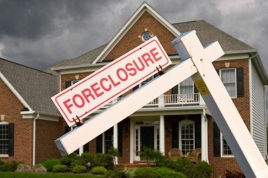How to Avoid Foreclosure During the Coronavirus Pandemic
Monday, March 23, 2020
Due to the global Novel Coronavirus (COVID-19) outbreak, homeowners are now faced with unforeseen difficulties due to the unexpected economic turndown. Many are at risk of defaulting on their mortgage payments, or worse, foreclosure. However, relief is on the way.
On the state level, California Governor Gavin Newsom signed an executive order which issued a moratorium on all foreclosure and eviction proceedings through May 31, 2020, which is to be implemented by local governments. The order takes into consideration that millions of Californians are now at risk due to the unprecedented work stoppages and lockdowns.
On the federal level, the government is asking lenders to consider modifying payment requirements in lieu of the economic downturn that has resulted from the coronavirus. For instance, the FDIC issued a statement encouraging financial institutions to take prudent steps to assist customers and communities affected by COVID-19. This includes waiving certain late payment fees, increasing credit limits for some borrowers and extending payment due dates, in order to serve the long-term interests of communities and the financial system.
In addition, the Department of Housing (HUD) will suspend foreclosures and evictions for mortgages insured by the Federal Housing Agency (FHA) until mid-April. And loan servicers servicing Freddie Mac and Fannie Mae backed loans have been directed to stop initiating any new foreclosure actions and to suspend any foreclosures in progress until at least mid-May 2020 and to consider reducing payments or pause mortgage payments for up to 12 months, depending on the borrower’s circumstances.
In the private sector, some lenders have already proposed ideas to alleviate the mortgage burdens for consumers. Bank of America, Wells Fargo, and Quicken Loans, among others, are encouraging borrowers to contact their lenders to discuss their options, including mortgage forbearance, which gives the borrower an option to potentially and temporarily suspend or reduce mortgage payments due to hardship caused by the COVID-19 pandemic.
What steps should you consider taking?
- Contact Your Mortgage Servicer/Lender: You cannot merely stop making your mortgage payments. Communication with your lender or mortgage servicer is critical to determine if there is a loan workout program available for your loan. You will likely be in a better position if you contact your servicer before the initiation of foreclosure proceedings instead of after you defaulted on your mortgage. Depending on your lender, there may be various programs available to you, including a forbearance plan, which will temporiarly suspend or reduce your mortgage payment.
- Create A Budget: Create a budget to repay the amount that has been forborne, reduced or suspended. You will need to repay this amount and each lender may have different terms with respect to that repayment (i.e. lump sum or repayment plan where smaller amounts are tacked on to your regular monthly payment). These programs are not a forgiveness of debt or free money.
- Protect Your Credit Score and Stay on Top of Your Credit Report: Should you enter into a forbearance, repayment or other type of plan with your lender, it is important to understand the consequences such an arrangement may have, if any, on your credit report. For instance, with a Freddie Mac, Fannie Mae or FHA backed loan, a homeowner with a forbearance plan will likely not have past-due payments reported to the credit bureaus for a certain period of time. You want to raise this issue with your loan servicer and confirm that your credit score is not negatively impacted in the event you enter into a forbearance or other type of plan. You can request free copy of your credit report every 12 months from each of the three credit bureaus – Equifax, Experian and TransUnion. Visit www.annualcreditreport.com to retrieve your report.
- Consider Filing for Unemployment Benefits: Consider filing for unemployment through your state’s unemployment department to determine if you are eligible for such benefits.
-
If you have fallen behind on your payments and contacting your mortgage servicer for options has been unsuccessful, contact Bezdik Kassab Law Group for a no cost consultation to better understand your legal rights. The attorneys at Bezdik Kassab have litigated and/or managed thousands of cases relating to wrongful foreclosure due to loan servicing and other errors and can assist you with formulating a strategy to ensure that your legal rights are protected and to help you keep your home.
Raffi Kassabian, Esq. and Sareen Bezdikian, Esq. joined forces to launch their law partnership – the Bezdik Kassab Law Group. Together, Kassabian and Bezdikian bring over 26 years of legal experience.
Prior to starting Bezdik Kassab, for nearly 10 years, Kassabian was an associate and then Counsel for a top 25 international law firm and Bezdikian managed her own law practice for over 13 years.
Based in Pasadena and Irvine, Bezdik Kassab’s focus is twofold. The firm’s Business Litigation & Transactions (BLT) practice focuses on clients’ business and real estate needs – including starting, selling or buying business entities, negotiating contracts and litigating business or real estate disputes as well as matters relating to landlord/tenant, estate planning and trademark/copyright.
“We started a firm that would be a one-stop shop to address a client’s multiple business and real estate needs,” said Bezdikian. “Since Raffi and my expertise are in two different areas – deal making and litigation – we are able to assist our clients with all their needs under one roof.”
http://asbarez.com/193177/how-to-avoid-foreclosure-during-the-coronavirus-pandemic/





